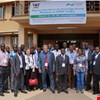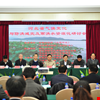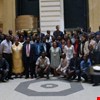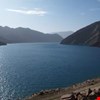


The Regional Inter-University Knowledge Sharing Workshop kicked off in Uganda’s capital Kampala, December, 5th 2012, participants urged for sustainable water resources management as a means to reverse the continuing water scarcity in the region.

Vanh Mixap from Laos and Elisabeth Tarigan from Indonesia have been awarded the GWP-Ken Thiess Scholarship with the International WaterCentre (IWC) in Australia.

The Workshop on Climate Change, Flood Control and Optimized Use of Rain Water, for this purpose, was organized by GWP China Hebei in cooperation with Hebei Provincial Hydraulic Engineering Society on November 26 and 27, 2013 in Baoding City, Hebei Province.
Are you interested in studying Climate and Water? Through the Water and Climate Education Programme, you can do this for free!
International Union for Conservation of Nature (IUCN) launched its new project “Mega-cities and their Watersheds: Nature-based Solutions for Sustainable Drinking Water Sources” on November 26, 2013 in Beijing.

This year’s UN Climate Change Conference (COP19) brought some good news for the water community, said the GWP delegates who participated at the event in Warsaw, Poland 11-22 November.

Water, Climate and Development Programme (WACDEP) Training of Trainers (ToT) on ‘Economics of Adaptation, Water Security and Climate Resilient Development in Africa’ - Contribution to national adaptation plan Global Support Programme (NAP-GSP) – will be held in Addis Ababa, Ethiopia from 25th to 29th November 2013.
The Conference was held at VNIIGiM named by A.N.Kostyakov (Moscow) on the 8th of November 2013. The Conference was organized by OAO “Vodstroy”, the Russian Union of Water and Land Reclamation Professionals, VNIIGiM named by A.N.Kostyakov (Moscow) and the Scientific-Information Center of ICWC (NWO EECCA Secretariat, Tashkent). This event was supported by GWP CACENA and UNECE (through the RF grant).
As capacity-building support to its Partner organisations, the Global Water Partnership (GWP) together with the University of Dundee, will offer scholarships for 30 participants to undertake a module in International Water Law, in Dundee from June 9th - 20th, 2014.

As capacity-building support to its Partner organizations, GWP, together with the University of Dundee will offer scholar-ships for 30 participants to undertake a module in International Water Law, in Dundee 9-20 June 2014.
Applications will be accepted from 20 November 2013 to 15 February 2014.